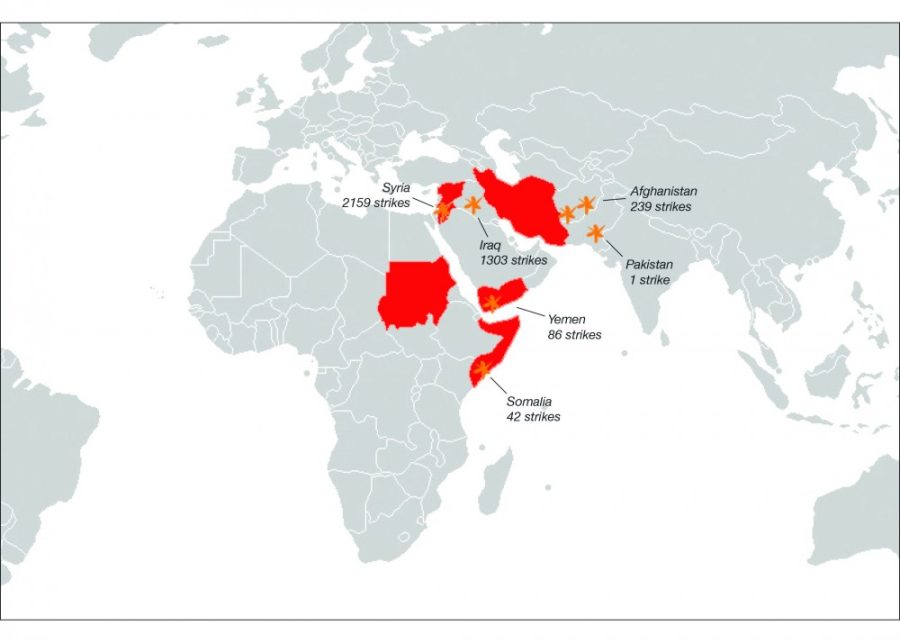President Donald Trump’s foreign policy and military posturing during his first 100 days in office has had a direct impact on the UA’s population of international students.
Among those who have felt the strongest ripples, though, are those from the regions surrounding the Middle East and North Korea.
Military posturing in the Korean Peninsula and the Trump administration’s two—as of now blocked—efforts to ban travel from eight Middle Eastern and predominantly Muslim countries has created an air of uncertainty for UA international students representing those regions.
Since 2010, UA has had an increase in international student enrollment numbers, and its most recent head count in 2016 had 3,964 students from 112 countries attending the university.
The UA Office of Global Initiatives has even advised students from countries implicated in the travel bans not to leave.
RELATED: ‘I don’t have a place in my heart for Somalia right now’
The Middle East
Iranian immigrant, Alyeh Mehin, who also is a UA teacher and graduate student in the Middle East and North African department, said that she won’t be traveling this summer due to the executive order due to fear that her visa won’t be honored.
“Before the ban, they say they feel like America is such a home, the community where they are living, their apartments they would see it as home,” she said. “After that there was always this question, ‘is this really home, who could kick you out of your own home,’ so there’s this idea that maybe this is not home anymore.”
She said it has been the inclusiveness within the country that improves it. “We make this country the United States, all the great people from all over the world come here …”
Mehin’s fears were met with support, but particularly from Joanne Lagasse Long of International Student Services. Lagasse Long was just one of the many people who took the time to meet with Mehin.
“I counted myself as fortunate enough to be in this particular place at this moment, I would say it didn’t affect me that immensely because I had the group of nice people around myself,” she said.
Atacan Atakan, a Turkish immigrant and graduate student said she’s found that a person’s nationality has begun to matter less and less. If you look a certain way, you’re automatically pegged as Muslim.
“Instead of perceiving the people [as] Iranians, Turkish, Iraqi or Syrian there’s this holistic perception like, Middle Eastern and if you’re Middle Eastern you’re Muslim automatically,” Atakan said.
He said for this reason there are increased chances there can be prejudice, discrimination and mistreatment from the executive order.
“It destroys the possibility to learn more about different people or to provide communication and negotiations, Atakan said.
RELATED: Trump signs revised executive order limiting refugees, Middle East travel
North Korea
The developing nuclear power of North Korea has the Trump administration—and the rest of the world—on guard. North Korea’s leader Kim Jong-Un has said the country would be ready to attack if provoked.
Trump called the country’s continual testing of its weapon systems the “greatest immediate threat”. He ordered an armada -or a fleet of warships- to the Korean peninsula.
“He seems to have made more provocative statements regarding North Korea, suggesting that he might be considering taking more aggressive action than previous presidents,” said Paul Schuler, assistant professor in the School of Government and Public Policy.
Schuler said the Trump administration’s strategy does have risks involved.
“It’s a higher risk strategy, in the sense by seeming to increase the probability that we’re going to attack somebody, particularly North Korea, it does create the possibility that North Korea may preemptively strike in anticipation that we’re going to do something.”
He said that it didn’t appear the problem was going away without doing something different.
“I don’t think anyone was happy with the status quo,” Schuler said. “With that said we have the deterrent even if they did have a long range missile… if they ever fired it, it would still mean the end of the North Korean regime.”
If the plan did not work, Schuler said the consequences would directly impact Japan and South Korea.
The U.S. could also rely on China to pressure North Korea as its major trade partner.
“I think certainly pressuring China is a good strategy, it’s been the policy to try do that for a long time so it’s nothing new the Trump administration trying that tactic,” Schuler said. “What is new is that he seems to be trying to use other levers, such as tying our trade relationship with China to their activity or behavior with North Korea, which previous presidents hadn’t done.”
The risk in tying trade is the possibility China does pressure North Korea more than they already have, Schuler said. “Does that mean we then have to follow through with starting some type of trade war with China which would be more than likely unpopular in terms of the affects it would have on the U.S. economy.”
Follow Shaq Davis on Twitter.









